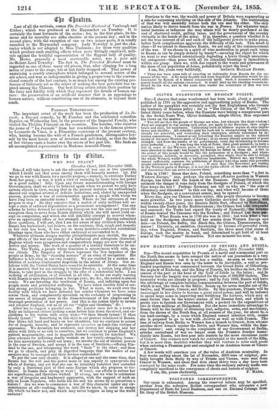OLIVER GOLDSMITH ON RIISSIAN POLICY.
Sin—I observe that some wonderment has been made about a pamphlet published in 1791 on.the aggressive and aggrandizing policy of Russia. The author of the pamphlet was certainly not the first Englishman who foresaw the tendency of Russian policy ; for in "The Citizen of the World," pub- lished thirty years before, when the Russians were takings conspicuous part in the Seven-Years War, Oliver Goldsmith, simple Oliver, thus expressed his views on the matter.
"You tell me that the people of Europe are wise, but wherein lies their wisdom? They are engaged in war among each other, yet apply to the Russians, their neigh- bours and ours, 'for assistance. Cultivating such an alliance argues at once impru- dence and timidity. All subsidies paid for such aid is strengthening the Russians,. already too powerful, and weakening their employers, already exhausted by in- testine commotions. I cannot avoid beholding the Russian empire as the natural enemy of the more Western parts of 'Europe; as an enemy already possessed of great strength, and from the nature of its government, every day threatening to become more powerful. . . . . It was long the wish of Peter, their great monarch, to have a fort in some of the Western parts of Europe ; many of his schemes and treaties were directed to this end; but happily for Europe he failed in them all. A fort in the power of this people would be like the possession of a floodgate ; and when- ever ambition, interest, or necessity, prompted, they might then be able to deluge the whole Western world with a barbarous Inundation. Believe me, my friend, I cannot sufficiently contemn the politicians of Europe who thus make tins powerful
i people arbitrators n their quarrel If once they [the Russians] get footing
in the Western parts of Europe, it is not the feeble efforts of the sons of effeminacy and dissension that can serve to remove them."
This in 1760! Since that date, Poland, something more than "a fort in Western Europe," nay, perhaps the strongest offinsive position in Western 'Europe, has fallen into the hands of the Russians. Perhaps Germany can estimate the danger it runs daily from the floodgate of Poland, of which the Czar keeps the key ? Perhaps Germany can tell us who are "the sons of effeminacy and dissension" in this our day, and what will become of .them when the floodgate, at a convenient season, may be opened? Every day, says our Chinese letter-writer, this people threatens to become more powerful. In two years more Catherine ascended the throne; and within twenty-three years, the Russian Baltic fleet, officered by Scotchmen, had beaten the Turks in 'the Mediterranean ; the Crimea had been conquered and annexed ; the Turks had signed the treaty of Kainardji ; the frontier ref Russia toward the Caucasus was the Reuben; and Poland had been par- titioned! What Russia was in 1760 she was in 1853; but with what a vast hold on the floodgates shutting off her armies from Western Europe and Asia—on Poland, the Baltic, the Black Sea, the Crimea, Transcaucasia, the Amoor ! Certainly, an ambition, threatening to become all-powerful every day, when England, France and Sardinia, the three most vital states of Eurepe, took the 'matter in, hand, and determined to get hold of at least some of the "floodgates" themselves. 'Not one moment too soon.
G. H.
























 Previous page
Previous page